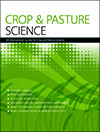Ditch-buried straw return (DB-SR) has shown to improve soil processes in the short term. However, how long-term implementation of DB-SR affects soil carbon and nitrogen processes and crop yields is still unknown. Our results suggest that long-term DB-SR application has positive effects on rice and wheat grain production, but possibly through different mechanisms in improving soil processes, which can provide some theoretical support for the practical application of DB-SR in the rice-wheat rotation systems.

Crop and Pasture Science
Volume 72 Number 4 2021
CP20459Genome-wide association among soybean accessions for the genetic basis of salinity-alkalinity tolerance during germination
 , Xincao Zhang, Shihao Jia, Benjamin Karikari
, Xincao Zhang, Shihao Jia, Benjamin Karikari  , Mingjun Zhang, Zhangyi Xia, Tuanjie Zhao and Fuqin Liang
, Mingjun Zhang, Zhangyi Xia, Tuanjie Zhao and Fuqin Liang
Salinity-alkalinity stress is one of the main factors limiting soybean crop growth and production. However, few genetic sources are available for improvement. We elucidate the genetic basis of soybean salinity-alkalinity tolerance at germination by a genome-wide association study. We identified single nucleotide polymorphisms and important quantitative trait loci as well as tolerant accessions that will improve the efficiency of marker-assisted breeding and candidate gene discovery.
CP20161Overexpression of TERF1 in sugarcane improves tolerance to drought stress
Genetic engineering offers a rapid solution for improving the tolerance level of sugarcane against drought stress. Tomato ethylene responsive factor 1 (TERF1) gene conferred drought tolerance to transgenic sugarcane through modulation of accumulation of osmo-protectant and antioxidant metabolism. Thus, the gene may have regulatory function in response to drought stress in sugarcane.
CP20394Genetics of physiological and agronomical traits linked to salinity tolerance in tomato
This research was conducted with tomato to discover genetic resources for salinity tolerance for use in plant breeding projects. Genetic control of fruit weight is complex, and that complex inheritance should be considered in the selection of salt-tolerant progenies in segregating generations. Results revealed that salt-tolerant genotypes could result when simultaneous selection is done for fruit weight, cell membrane stability, proline and leaf relative water content.
We modelled the potential distribution of Hass avocado crop in Mexico using different climate change scenarios. We found that the expansion of avocado cultivation will likely exacerbate water resource scarcity problems and conduct to the deforestation of forest mountain ecosystems. Territorial planning should prioritise conservation policies to avoid land-use change and establish strategies to maintain avocado crop sustainability in the long-term under climate change scenarios.
Milk thistle is an oil and medicinal crop known as an alternative oil crop with high level of unsaturated fatty acids, making it a favourable edible oil for use in food production. Biochemical diversity, understanding of changes induced by water deficit stress in the secondary metabolites, and their relationships with production traits in native germplasm is poorly understood in milk thistle. We evaluated diversity in a 26 ecotypes of this plant for biochemical and productive properties.
CP20287Investigation of two native Australian perennial forage legumes for their potential use in agriculture: Indigofera australis subsp. hesperia and Glycyrrhiza acanthocarpa
Past attempts to commercialise native pasture legumes for use in broadacre agriculture in southern Australia have failed. Two species thought to have most of the desirable traits for domestication were collected from Western Australia and grown in a field nursery. Indigofera australis produced large amounts of herbage in winter with no toxins harmful to ruminants, and tolerated heavy cutting. Glycyrrhiza acanthocarpa produced modest amounts of seed and survived for three years. Both species are worthy of further field testing.



